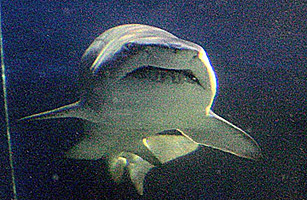
The only way to explain this lunacy is that you had to be there. There is the bottom of the Caribbean Sea just of the Bahamas, where eighteen of us are kneeling, watching nine-foot Caribbean reef sharks circle, and even nip a man wearing a metal suit only a few feet away.
The event is a reef shark feeding expedition offered by Xanadu Undersea Adventures. Many scientists are critical of these tours, arguing that they change the natural behavior of sharks toward humans — not always for the better. Reef sharks have been known to attack divers, but for the most part they are relatively docile. To get here we have each paid $79 and piled onto Adventure One, a 39-foot vessel, heading half an hour from Freeport, Bahamas to a hole over 84-degree, Windex-blue water.
We reach a site over a mile off shore and plunge one at a time into the pure blue water. We see them below, dark, unmistakable shadows slowly circling coral reefs. They remain within 30 yards while we plummet 45 feet to the ocean floor where we are lined up on our knees, our hands crossed in a prayer style that seems faintly reassuring. We have been warned that fluttering appendages might confuse the sharks. No one wants to be mistaken for a feeder.
Once we settle in, the feeder shows up, wearing a loose, stainless steel mesh body suit that covers everything, including head and hands. More than a dozen sharks, from seven to nine feet in length, instantly arrive, bumping up against the front of his torso near the tube of fish he carries. I flinch as something bumps my leg, but it is only another diver's fin. I notice a safety diver behind our line of kneeling divers and feel reassured. The feeder pulls a small fish, a grunt, from a small round tube of grunt as three-foot grouper tear about and a five-foot stingray glides into the mlange.
The feeder places a hand on the snout of a nine-foot shark and rubs it. The shark's eyes appear to roll, and the creature becomes docile, as in a trance. Then he carries it over for each of us to touch, holding the head far away. We have been warned not to touch any shark, with the exception of this one moment. My reluctance to participate in this artificial encounter yields to my curiosity and I pass my hand over the shark's midriff and its dark tipped tail. The pale gray skin is rough and leathery, the tail thick.
The trance experience, which biologists don't completely understand, is thought to occur when the tiny metallic chain links in the feeder's suit run over the shark's electromagnetic sensors in its snout which is used to detect prey.
After five minutes, the feeder releases the shark, which swims away with no sign of agitation, all captured by a staff video photographer who records us waving into the lens. In 25 minutes on the ocean floor, our fear has given way to curiosity and then awe at the splendor of the magnificent creatures before us. The sharks meander closer to us, some only inches away, always returning back to the feeder. Their white yellow eyes check us out as they head toward us, then veer up and over in a relentless scanning motion. Fishing lines flow from in their mouths where fishermens' hooks must have lodged. Some bear scratches over their golden gray forms, perhaps sustained in previous feedings.
As the feeder and his fish tube depart from us, the sharks veer away to follow, disappearing as quickly as they descended. Have we witnessed a circus show that compromises the creatures' native wildness, or a rare opening into a world most of us know only through Hollywood (shark) thrillers, I wonder. We have encouraged human-shark encounters, which affect both the animal's habits and the nerves of other divers who may be unaware of these encounters and stunned by unwelcome attention. And if one of us were to be injured — though the odds appear miniscule — we may assist the unleashing of a cruel backlash against creatures simply being themselves.
One by one, we begin our ascent to our boat. As I glide across a coral reef, I am among the last to leave the site. About 30 feet away a lone shark about nine feet long is eyeing me. Something in my stomach clutches involuntarily, then relaxes, and I move on.